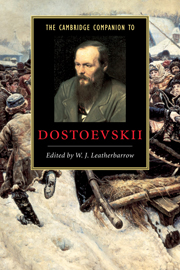Book contents
- Frontmatter
- 1 Introduction
- 2 Dostoevskii and the Russian folk heritage
- 3 Dostoevskii and literature
- 4 Dostoevskii as a professional writer
- 5 Dostoevskii and money
- 6 Dostoevskii and the intelligentsia
- 7 Dostoevskii and psychology
- 8 Dostoevskii and religion
- 9 Dostoevskii and the family
- 10 Dostoevskii and science
- 11 Conclusion
- Further reading
- Index
5 - Dostoevskii and money
Published online by Cambridge University Press: 28 May 2006
- Frontmatter
- 1 Introduction
- 2 Dostoevskii and the Russian folk heritage
- 3 Dostoevskii and literature
- 4 Dostoevskii as a professional writer
- 5 Dostoevskii and money
- 6 Dostoevskii and the intelligentsia
- 7 Dostoevskii and psychology
- 8 Dostoevskii and religion
- 9 Dostoevskii and the family
- 10 Dostoevskii and science
- 11 Conclusion
- Further reading
- Index
Summary
Dostoevskii's fictional world is dominated by money. One critic has identified it, along with epilepsy, as 'the ruling power in Dostoyevsky's creative environment'. It confronts his characters at every step and their awareness of it is often articulated. Dmitrii in The Brothers Karamazov reflects ruefully: 'without money you can't take a step in any direction' (xiv, 344; Bk 8, Sec. 3). Makar Ivanovich, the wise old peasant in A Raw Youth, says: 'Even if money is not God - it is at least a demi-god' (xiii, 311; Pt 3, Ch. 3). Aleksei puts it even more strongly in The Gambler, when he states categorically: 'Money is everything!' (v, 229; Ch. 5)
Painfully sensitive to the significance of money in human affairs, Dostoevskii was fully conscious of its ability to function as a medium in literary communication. But money as theme and message is also central to his writing. He recognises that money is power and its unequal distribution a cause of massive suffering and conflict. The close examination of social hardship is one of his primary concerns as a novelist. Rejecting the option of forcible redistribution of wealth through revolution and bloodshed, he nevertheless opposes strongly the frenzied pursuit of money by fair means or foul and the unprincipled use of money-based power. He presents money above all as a touchstone, a moral challenge, and his concern is how individuals obtain it, spend it and live with it.
- Type
- Chapter
- Information
- The Cambridge Companion to Dostoevskii , pp. 93 - 110Publisher: Cambridge University PressPrint publication year: 2002
- 1
- Cited by

